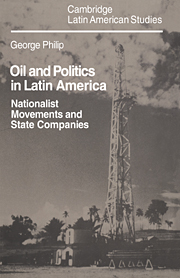Book contents
- Frontmatter
- Contents
- List of tables
- Preface
- Glossary
- Abbreviations
- Note on currencies and other units of measurement
- Maps: Latin America in 1920, 1940, 1960 and 1981; showing importing countries, exporting countries and countries self-sufficient in oil
- Introduction: The politics of oil in twentieth-century Latin America
- Part I The world oil environment
- Part II The major expropriations
- Part III The state oil companies
- 17 Pemex in Mexican politics 1938–79
- 18 The development of Petrobrás: oil company to conglomerate?
- 19 ypf 1932–1979: public enterprise or bureaucracy?
- 20 Petroperú 1968–80: achievements and hard lessons
- 21 ypfb and the development of oil in Bolivia
- 22 Petrovén: the birth of a giant
- 23 State oil companies in Latin America
- 24 Concluding reflections
- Notes and bibliography
- Index
- CAMBRIDGE LATIN AMERICAN STUDIES
23 - State oil companies in Latin America
Published online by Cambridge University Press: 23 December 2009
- Frontmatter
- Contents
- List of tables
- Preface
- Glossary
- Abbreviations
- Note on currencies and other units of measurement
- Maps: Latin America in 1920, 1940, 1960 and 1981; showing importing countries, exporting countries and countries self-sufficient in oil
- Introduction: The politics of oil in twentieth-century Latin America
- Part I The world oil environment
- Part II The major expropriations
- Part III The state oil companies
- 17 Pemex in Mexican politics 1938–79
- 18 The development of Petrobrás: oil company to conglomerate?
- 19 ypf 1932–1979: public enterprise or bureaucracy?
- 20 Petroperú 1968–80: achievements and hard lessons
- 21 ypfb and the development of oil in Bolivia
- 22 Petrovén: the birth of a giant
- 23 State oil companies in Latin America
- 24 Concluding reflections
- Notes and bibliography
- Index
- CAMBRIDGE LATIN AMERICAN STUDIES
Summary
In the oil industry, as in many other areas, state enterprise in Latin America has developed as an alternative to foreign investment. Such an alternative suggests an obvious point of comparison. This chapter will therefore begin by considering those areas in which the foreign companies might be thought to possess an advantage – scale economies, access to technology and finance, and experience of diversity – and will go on to examine the extent to which state companies can be given greater freedom in pricing and investment decisions. Finally, it will go on to consider the less tangible but perhaps even more important question of political control.
In order to evaluate these questions, it will be useful to look again at the activities of the main state oil companies and the position of their oil industries. It can be seen from table 23.1 that two state companies (Pemex and Petrovén) which already control very extensive hydrocarbon reserves are the only ones to have maintained a completely unqualified state monopoly upstream. It is much more common, however, for state oil companies to maintain a monopoly of refining and of the marketing of natural gas; of the six companies already considered, only YPF allows private refineries to operate and there is evidence that this policy has inflicted significant extra costs upon the state enterprise.
- Type
- Chapter
- Information
- Oil and Politics in Latin AmericaNationalist Movements and State Companies, pp. 481 - 493Publisher: Cambridge University PressPrint publication year: 1982



